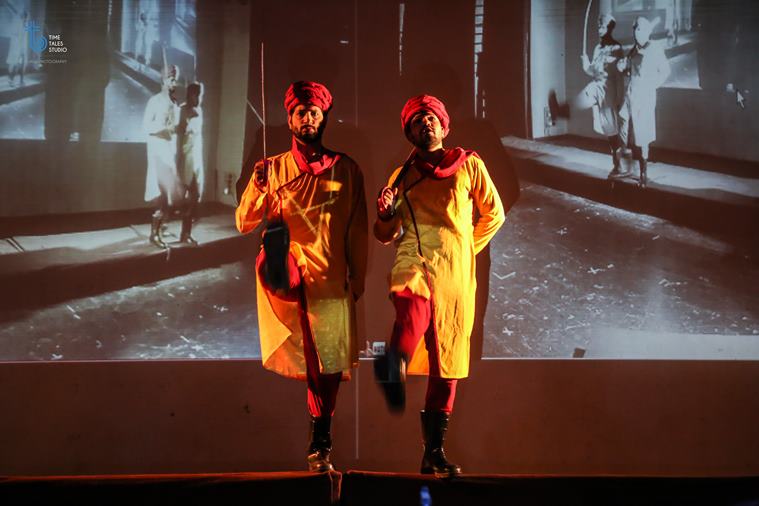
A laptop rests on Niranjan Pedanekar’s table, next to a coffee mug that says, “But first Kafka”. The former is crammed with data feeds, algorithms for applications of Artificial Intelligence and research on Machine Learning. The latter holds liquid as dark as dystopian humour. Pedanekar, principal scientist at Tata Research Development and Design Centre in Pune, is also a leading theatre maker.
His latest work, Shahi Pehredar, is based on Pulitzer Prize-winner Rajiv Joseph’s play, Guards at the Taj. It is staged under the gaze of a drone, CCTV cameras and live-streaming monitors to give audiences a taste of a surveillance State. “When a drone flies in your face, what do you see? What do you feel? You feel a sort of control and that someone’s watching,” he says. After Pune, Shahi Pehredar will be staged at the National Centre for the Performing Arts, Mumbai, in September.
The story opens the night before one of the world’s most beautiful memorials to love is unveiled. Two watchmen, Humayun and Babur, stand on duty under a starry sky. “To ensure that a monument like the Taj Mahal is not built again, Badshah salamat has issued a farman (decree) that the hands of its architects and artistes be amputated,” says Humayun. “All 20,000 of them?” asks Babur, indicating the number of artistes. “All 40,000 of them,” answers Humayun, indicating the number of hands. A blood-splattered scene shows that the guards have carried out the farman. Now, they must battle their own nightmares.
Pedanekar isn’t getting into a debate over the veracity of legend. He starts the play with a disclaimer. “There is as much truth in this story as there is salt in dal,” he says. A 380-year-old, apparently false, narrative of a powerful ruler who had artistes silenced by sword-wielding foot soldiers is contrasted with a real presence of surveillance technology.
The director’s understanding of audience reaction can be traced to his day job. “My work stands on the crossroad of behavioural science, entertainment and data science. We are writing algorithms that will enable us to annotate media, such as films, sports and news, in various ways, automatically,” he says.

Pedanekar’s journey as a scientist started when he topped Class X board examinations, SSC, in Maharashtra. He was seventh on the merit list. In Class XII, he ranked 14th in the state. “If you do well academically, you go into certain professions. Nobody thinks that it is important that you are good at writing or you have some amount of theatre in you,” he says. What he enjoyed as a solitary child was languages. “I liked writing poetry, reading, constructing stories and studying history and geography more than I liked maths,” says Pedanekar, who graduated from the College of Engineering, Pune.
He discovered theatre in Class V when his teachers cast him as the poet-saint Dnyaneshwar, and later, as Shivaji. Theatre remained on the wings as Pedanekar grew up, and when he joined Cognizant as a senior architect in 2007, it took flight during an inter-corporate competition called Expressions 2010. He wrote a play called Kankya Rajachya Deshat (In the Land of King Kankya), whose title was a tribute to Satyajit Ray’s Hirak Rajar Deshe (1980). In it, cancer cells are fun-loving while the human world is conflicted. “A few of my relatives had died of cancer, but I didn’t want to make the play serious. I presented it as a black comedy,” he says. The play won the competition. The next year, Pedanekar wrote the Marathi play Cafe Wordsworth, in which conjunctions were the protagonists, with personalities borrowed from different regions of Maharashtra, all competing to be the head of the All India Marathi Conjunctions Words Development Association.
“One thread common in all that I do is that I try to go into the science and structure, the whys and whats of the form. For playwriting, I consulted books and people, I went into the structure of writing, right from Aristotle’s Poetics to Kurt Vonnegut’s (rejected master’s thesis on ) the shape of stories. I like meanings that go deep and make my work complex. The complexity allows people a richer experience,” he says. Pedanekar has 17 plays in English, Hindi and Marathi to his credit — of which he has directed 13 — mostly translations and adaptations.
His earliest adaptations were Anton Chekhov’s The Bet (1889) as the Marathi play, Paij, in 2010, Jose Saramago’s Death at Intervals (2005) as Ek Meli Premkatha in Marathi in 2012 and Neil Gaiman’s The Day I Swapped My Dad for Two Goldfish (1997) as the English-language play Swapped, also in 2012. In 2013, he plunged into Franz Kafka and adapted three works almost at once — Metamorphosis (1915), A Hunger Artist (1922) and In the Penal Colony (1919). The last two he directed for the stage the same year as Upashya and Machine, respectively. Upashya was staged at the Bharat Rang Mahotsav in Delhi in 2016.
One of his definitive works is the Marathi-English-Hindi play Exile (2015), based on the works of Palestinian poet Mahmoud Darwish. Pedanekar staged the play in a flatbed truck that is used to transport vehicles. Reality mixes with fantasy in the production as the ideas of Darwish fuse into the alienation and loss of identity of people commuting in an urban space.
Pedanekar’s personal truth is mapped out on a sheet of paper that he carries in his backpack. It is a chart of his theatre ambition. Right on top are the answers to the question — “Why am I in theatre?”. “To contribute original stuff to theory and practice of theatre; be able to nurture theatre folks who are ready to look beyond what exists and test new technologies and mediums and cross-pollinate,” he says.“My personal intention is to assist artistes to create better art and better engagement with the aid of machines. It is a human-machine co-creation rather than just machine creating everything and you just consuming. It allows artistes to be even better,” he adds.
This article appeared in the print edition with the headline ‘All Along the Watchtower’